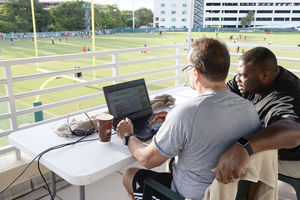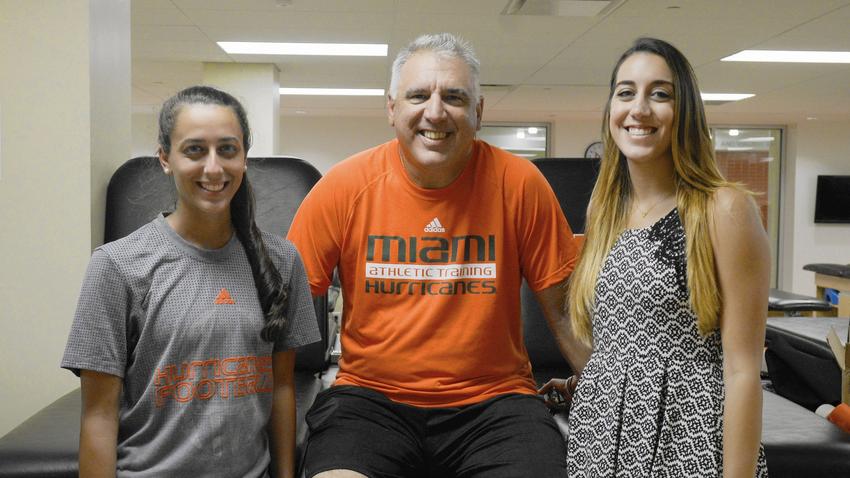
Every night throughout training camp, Hunter Knighton took a pill given to him by athletic trainers at the University of Miami.
When he arrived on campus for football practice each morning, he met with trainers to make sure the pill — designed not to alleviate pain or heal anything but to monitor his internal body temperature — was still in his system. Just before taking the field, Knighton and up to 29 of his teammates pulled on harnesses outfitted with small GPS trackers. And after practice, most of the players watched specialized high-definition video footage recorded by a pair of drones that hovered over the field.
As the Hurricanes prepare for another season, which opens tonight at 6 at home against Bethune-Cookman, they’ve become part of a growing number of college football programs that have turned to technology to help keep players safe and improve performance.
At Miami, Florida State, South Florida and Central Florida and more than two dozen other schools, GPS technology has helped coaches see how fast their players are running, how much ground they’re covering, and in some cases, even how hard they’re getting hit in practice.
Likewise, a handful of schools such as UCLA and Louisville have also turned to camera-outfitted drones to film practice and give coaches and players an overhead view of the field.
At Stanford, the Cardinal is embracing virtual-reality training, and at Tennessee, the Volunteers have been using sleep monitors to make sure players are getting enough rest. And play books on iPads or other tablets have become commonplace.
College football is changing, and the Hurricanes are doing their best to keep pace.
“The genie’s out of the bottle,” Miami Coach Al Golden said. “We’re not going back to the conventional way. I don’t know how we did without some of this before. … I think back to when I was playing and I wonder, ‘Would I want that on me?’ But I think this team is so trusting and is in such a place where they just want to do whatever they can to win that they understand why we’re doing these things and how they can benefit us. I think they also understand that because of those results, we’re tailor-making practice. And we’re changing. Practice is much more fluid than it used to be. It used to be this rigid structure. It’s not like that anymore.”
With the help of the Catapult GPS system worn by most of Miami’s starters through spring practice and fall training camp, Golden and his staff have tried to create the perfect practice. They can see — in real time — when players are getting overworked and need to take a break. They’ve built in additional rest and teaching periods after the more intense portions of practice. And if a player exerts himself too much — as one did on the day he covered more than 7,000 yards in a single workout — Miami coaches and trainers pull him off the field and ease his workload until his body has recovered.
And through camp, the system has seemingly worked as Golden has hoped. Though a handful of players are dealing with minor injuries, the Hurricanes expect to enter the season relatively healthy. At Florida State, where the Seminoles used similar technology during their run to the 2013 national championship, Seminoles Coach Jimbo Fisher said preventable soft-tissue injuries were down by 88 percent over the course of two seasons.
Players, for their part, appreciate the GPS technology, which is attached to a tank-top like harness worn underneath their pads. They also admit they have a little fun with it, often asking trainers how fast they’ve run and competing with each other to improve their speeds and times.
“It helps me push myself and shows me how fast I’m running, what I’m gaining, what I’m losing. It helps me see where I’m at,” said Hurricanes linebacker Jermaine Grace. “There’s a lot of guys that come out here and push themselves and get a lot of reps. Coaches see that and then they know when to give us less reps so we’re not out here killing ourselves.”
As beneficial as the GPS systems and drone footage have been, few players have benefited from Miami’s new technological focus as much as Knighton, an offensive lineman pushing to make the kind of comeback rarely seen in football.
Knighton, a soft-spoken redshirt sophomore from Pottstown, Pa., collapsed during an offseason workout on a relatively cool February morning in 2014. He spent 12 days in a coma as a result of the heat stroke he suffered. His brain swelled, and he had seizures. His kidneys and liver started to fail. At one point, even breathing was a struggle.
But once out of the coma, one of the first questions he asked was when he’d be able to play football again. Knighton underwent more than a year of intensive rehabilitation and worked with experts at the Korey Stringer Institute, a facility founded by Kelci Stringer, the wife of the former Minnesota Vikings lineman who died of heat stroke in 2001. Now, Knighton is poised to play in tonight’s game.
One reason he can participate is the CorTemp pill he took nightly during training camp that helped coaches and trainers gauge his body temperature as Miami practiced in the August heat of South Florida.
The pill, which travels through the digestive system, emits a wireless signal that transmits the body’s internal temperature to a hand-held reader that, in Knighton’s case, was placed against the small of his back.
“It’s weird to think that a pill you swallow can tell you your temperature, but it’s been a big help and I’m really glad we have it,” said Knighton, who learned about the technology while at the Korey Stringer Institute. “It’s big peace of mind to know I don’t have to guess my temperature. There’s a difference between feeling hot and having your temperature rising to that dangerous degree. Having a good scientific answer to that has been nice.”
Through camp, Knighton was the only player using the CorTemp technology, but Golden said he’s open to implementing it with other players in the future. He’s tried to be receptive to the ideas brought to him by players and coaches, including offensive coordinator James Coley, who broached him with the idea of using the drones to film practice last year. That video footage became an essential teaching tool for the Hurricanes and their quarterback Brad Kaaya, who as a freshman was scrambling to learn the ins and outs of Miami’s playbook and the rigors of college football.
Kaaya went on to set multiple school records for first-year players and earned recognition as the ACC Rookie of the Year after completing 59 percent of his passes for 3,198 yards and 26 touchdowns.
It was no coincidence to him, his coaches, or teammates that his numbers improved later in the season as he got more experience — and Miami’s staff perfected the art of flying the drone and gathering practice footage.
“I knew immediately the drone could help me coach a quarterback, especially a freshman,” Coley said. “So I used it to my advantage. … We had everything shot on the drone and it gave us a different angle. It looks like a video game. I can see coverages, they can see the depth on routes and how they fit within the concepts we’re teaching. It’s been great.”
And there is a cost, of course. UM officials wouldn’t talk about about how much they paid for these systems, but Catapult, which makes the GPS system, estimates it costs about $150 a month per athlete. So if 30 Hurricanes players use the system, that’s about $4,500 a month. Last year, the Associated Press estimated the drones to cost about $500 each. According to CorTemp, each pill/sensor is about $41, and the reader costs $2,600.
The Hurricanes aren’t sure what gadget they’ll add to their arsenal next, but trainers, coaches, and players all say they’re not afraid to experiment with more technology. Head athletic trainer Vinny Scavo wonders about heart-rate monitors. There have been experiments with goggles that can detect concussions, and Golden wants to make sure the majority of players are outfitted with the GPS technology sooner rather than later.
The key, he says, is to remain open-minded as technology and football continue to merge.
“It really is just challenging the status quo,” Golden said.
ORIGINAL ARTICLE:
http://www.sentinelsource.com/sports/miami-football-team-using-cool-gadgets-to-get-back-on/article_28672a42-1a11-5e9c-9fee-8378e8f0a3e7.html
